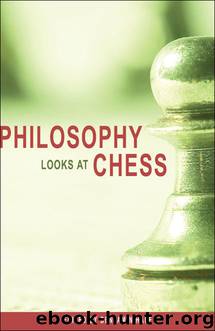Philosophy Looks at Chess by Benjamin Hale

Author:Benjamin Hale
Language: eng
Format: epub
ISBN: 9780812698183
Publisher: Open Court
NOTES
1. I later discovered that the quote comes from Philosophical Hermeneutics (Gadamer 1976, 32).
2. There are numerous accounts of the hoax; see, for example, Yanovsky 2000.
3. On the possible KGB connection, see Genna Sosonko’s unfriendly and unflattering obituary for Gufeld (2003).
4. My source for this admittedly quick and superficial investigation is the American Heritage College Dictionary, 3rd ed.
5. Taking on this Davidsonian language, and making the problems of language and meaning central to his work, is Rorty’s way of working around what had hitherto been the central concept in pragmatism—namely, experience. This avoidance and eschewal of the concept of experience places Rorty in an ambiguous relationship to the tradition of American pragmatism, to say the least. Meanwhile, it would have been interesting, I think, if Davidson had taken up chess as a test case for his notion of triangulation.
6. We might make an interesting comparison between the chess composer and the musical composer around what is perhaps the most important piece of music that was originally written as a set of student exercises, J. S. Bach’s Six Suites for Violincello Solo.
7. The foregoing represents a gloss on ideas that are much more difficult, complex, and subtle than can be explored here, and it seems silly to give as a “reference” a work as massive as Gadamer’s Truth and Method, where the notion of “fusion of horizons” is developed. Davidson develops the themes I mentioned in a number of essays, but of course the essential reference for these themes is the well-known essay, “On the Very Idea of a Conceptual Scheme.” Significantly, and no doubt unexpectedly for most analytic philosophers, Davidson devoted two essays to Gadamer’s work, “Dialectic and Dialogue” and “Gadamer and Plato’s Philebus”; these can now be found in the fifth volume of Davidson’s collected essays, Truth, Language, and History.
8. The latter case—“café chess”—has its own complications, such as the difficulty of working out a balance of friendliness and competitiveness in a setting where the stakes are almost entirely bound up with the ego—unfortunately, this is most often the male ego, or where there are not only other things going on at the same time—conversations, other distractions—but where these distractions may be used in the game by one or both players.
9. Again, I am simply glossing on arguments from “On the Very Idea of a Conceptual Scheme” and other essays such as “A Coherence Theory of Truth and Knowledge.”
10. Incidentally, one of Charles Hartshorne’s arguments for the existence of God runs along similar lines; as Donald Wayne Viney summarizes Hartshorne’s “epistemic argument,” “[T]he concept of reality is meaningless when divorced from the concept of knowledge or experience. But the only idea of knowledge adequate to clarify the concept of reality is divine knowledge.” See Viney 1985, 95, and Hartshorne 1970.
11. Of course, this line of reasoning can also be used to argue that in fact there really are no such things as the good or the beautiful; there is a relationship here to the coincidence of “everything/nothing happens for
Download
This site does not store any files on its server. We only index and link to content provided by other sites. Please contact the content providers to delete copyright contents if any and email us, we'll remove relevant links or contents immediately.
| Anthropology | Archaeology |
| Philosophy | Politics & Government |
| Social Sciences | Sociology |
| Women's Studies |
The remains of the day by Kazuo Ishiguro(8999)
Tools of Titans by Timothy Ferriss(8396)
Giovanni's Room by James Baldwin(7346)
The Black Swan by Nassim Nicholas Taleb(7129)
Inner Engineering: A Yogi's Guide to Joy by Sadhguru(6796)
The Way of Zen by Alan W. Watts(6614)
The Power of Now: A Guide to Spiritual Enlightenment by Eckhart Tolle(5781)
Asking the Right Questions: A Guide to Critical Thinking by M. Neil Browne & Stuart M. Keeley(5775)
The Six Wives Of Henry VIII (WOMEN IN HISTORY) by Fraser Antonia(5515)
Astrophysics for People in a Hurry by Neil DeGrasse Tyson(5190)
Housekeeping by Marilynne Robinson(4447)
12 Rules for Life by Jordan B. Peterson(4304)
Ikigai by Héctor García & Francesc Miralles(4274)
Double Down (Diary of a Wimpy Kid Book 11) by Jeff Kinney(4272)
The Ethical Slut by Janet W. Hardy(4253)
Skin in the Game by Nassim Nicholas Taleb(4248)
The Art of Happiness by The Dalai Lama(4130)
Skin in the Game: Hidden Asymmetries in Daily Life by Nassim Nicholas Taleb(4007)
Walking by Henry David Thoreau(3962)
